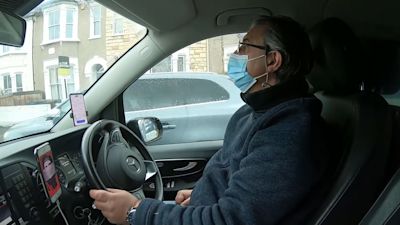Uber 'workers' celebrate but change in employment status may land company with huge tax bill

Nadar Awaad has driven for Uber for almost two years but today was a new day.
Uber now recognises his status as a “worker” and pledges to pay him accordingly.
“At face value it’s good news but the devil is in the details,” says Awaad. “We need to see how this will manifest itself really in life and in terms of rewards for drivers.”
If Nadar sounds sceptical it’s because Uber didn’t want to do this.
It has spent the last five years arguing that its drivers are self-employed contractors.
It took its fight to the highest court in the land and lost.
Henceforth Uber’s drivers will receive holiday pay, they’ll be enrolled in a pension plan and Uber guarantees they will earn at least the National Living Wage of £8.72 an hour - although they won’t be paid for the time they spend waiting for jobs.
The TUC welcomed the changes Uber is making for its 70,000 drivers in the UK.
“Uber’s business model was built on the back of exploitation,” says Francis O’Grady, head of the TUC. “Nobody should be paid less than national minimum wage so Uber has to sort out its business model, play fair and stop under-cutting decent employers”.
Uber offered ITV News an interview with the head of its UK business, Jamie Heywood, but then changed its mind.
Last month The Supreme Court ruled that Uber should be paying drivers for the time they are “logged in” to the app waiting for work.
We were keen to ask Mr Heywood why Uber has decided it won’t.
We also wanted to know if Mr Heywood thinks drivers will notice a significant difference in their monthly earnings as a result of these changes.
Uber says adopting the new worker model will not affect the company’s ambition to post a quarterly profit - on an adjusted EBITDA basis - before the end of the year.
And it says it hasn’t calculated how much better off the average driver will be.
The TUC estimates that five million people work in the gig economy.
Rachel Mathieson, an employment lawyer with Bates Wells and one of the solicitors who represented the Uber drivers in their test case, says other companies will have to make changes similar to the ones Uber has introduced.
“Private hire drivers but also couriers delivering food but also Amazon parcels out whatever it may be, all that precarious nature of working is likely to be looked at very closely,” she told ITV News.
The employment status of Uber’s drivers matters for Nadar, it also has tax implications for Uber.
The Supreme Court decision may land the business with a bill for unpaid VAT which could run to billions of pounds.
UK Uber drivers to get earnings guarantee, holiday pay and pensions
Uber cuts 3,000 jobs as coronavirus slashes payroll numbers by quarter
Businesses are seeking 'no jab, no job' contracts - what does the law say?